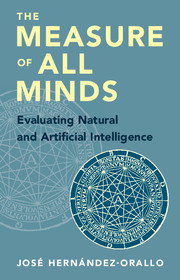Crossref Citations
This Book has been
cited by the following publications. This list is generated based on data provided by Crossref.
Scott, Andrew
Solorzano, Jose
Moyer, Jonathan D.
and
Hughes, Barry
2017.
Modeling Artificial Intelligence and Exploring its Impact.
SSRN Electronic Journal ,
Hernández‐Orallo, José
Baroni, Marco
Bieger, Jordi
Chmait, Nader
Dowe, David L.
Hofmann, Katja
Martínez‐Plumed, Fernando
Strannegård, Claes
and
Thórissons, Kristinn R.
2017.
A New AI Evaluation Cosmos: Ready to Play the Game?.
AI Magazine,
Vol. 38,
Issue. 3,
p.
66.
Telle, Jan Arne
2017.
Den nye maskinlæringen: Kunstig intelligens eller bare gode verktøy?.
Nytt Norsk Tidsskrift,
Vol. 34,
Issue. 2,
p.
192.
Vadinský, Ondřej
2018.
Artificial General Intelligence.
Vol. 10999,
Issue. ,
p.
248.
Fabra-Boluda, Raül
Ferri, Cèsar
Hernández-Orallo, José
Martínez-Plumed, Fernando
and
Ramírez-Quintana, M. José
2018.
Philosophy and Theory of Artificial Intelligence 2017.
Vol. 44,
Issue. ,
p.
175.
Bhatnagar, Sankalp
Alexandrova, Anna
Avin, Shahar
Cave, Stephen
Cheke, Lucy
Crosby, Matthew
Feyereisl, Jan
Halina, Marta
Loe, Bao Sheng
Ó hÉigeartaigh, Seán
Martínez-Plumed, Fernando
Price, Huw
Shevlin, Henry
Weller, Adrian
Winfield, Alan
and
Hernández-Orallo, José
2018.
Philosophy and Theory of Artificial Intelligence 2017.
Vol. 44,
Issue. ,
p.
117.
Ziesche, Soenke
and
Yampolskiy, Roman
2018.
Towards AI Welfare Science and Policies.
Big Data and Cognitive Computing,
Vol. 3,
Issue. 1,
p.
2.
Vadinský, Ondřej
2018.
An Overview of Approaches Evaluating Intelligence of Artificial Systems.
Acta Informatica Pragensia,
Vol. 7,
Issue. 1,
p.
74.
Vadinský, Ondřej
2018.
Towards General Evaluation of Intelligent Systems: Lessons Learned from Reproducing AIQ Test Results.
Journal of Artificial General Intelligence,
Vol. 9,
Issue. 1,
p.
1.
2019.
Rewriting Leadership with Narrative Intelligence: How Leaders Can Thrive in Complex, Confusing and Contradictory Times.
p.
257.
Fuller, Steve
2019.
The brain as artificial intelligence: prospecting the frontiers of neuroscience.
AI & SOCIETY,
Vol. 34,
Issue. 4,
p.
825.
Chaudhary, Mohammad Yaqub
2019.
AUGMENTED REALITY, ARTIFICIAL INTELLIGENCE, AND THE RE‐ENCHANTMENT OF THE WORLD.
Zygon®,
Vol. 54,
Issue. 2,
p.
454.
Gruetzemacher, Ross
2019.
A Holistic Framework for Forecasting Transformative AI.
Big Data and Cognitive Computing,
Vol. 3,
Issue. 3,
p.
35.
Hernández-Orallo, José
2019.
Unbridled mental power.
Nature Physics,
Vol. 15,
Issue. 1,
p.
106.
Wang, Pei
2019.
On Defining Artificial Intelligence.
Journal of Artificial General Intelligence,
Vol. 10,
Issue. 2,
p.
1.
Winfield, Alan F. T.
2020.
From Astrophysics to Unconventional Computation.
Vol. 35,
Issue. ,
p.
397.
Fürnkranz, Johannes
Kliegr, Tomáš
and
Paulheim, Heiko
2020.
On cognitive preferences and the plausibility of rule-based models.
Machine Learning,
Vol. 109,
Issue. 4,
p.
853.
Martinez-Plumed, Fernando
and
Hernandez-Orallo, Jose
2020.
Dual Indicators to Analyze AI Benchmarks: Difficulty, Discrimination, Ability, and Generality.
IEEE Transactions on Games,
Vol. 12,
Issue. 2,
p.
121.
Spelda, Petr
2020.
Machine learning, inductive reasoning, and reliability of generalisations.
AI & SOCIETY,
Vol. 35,
Issue. 1,
p.
29.
Gordon, John-Stewart
2020.
What do we owe to intelligent robots?.
AI & SOCIETY,
Vol. 35,
Issue. 1,
p.
209.



